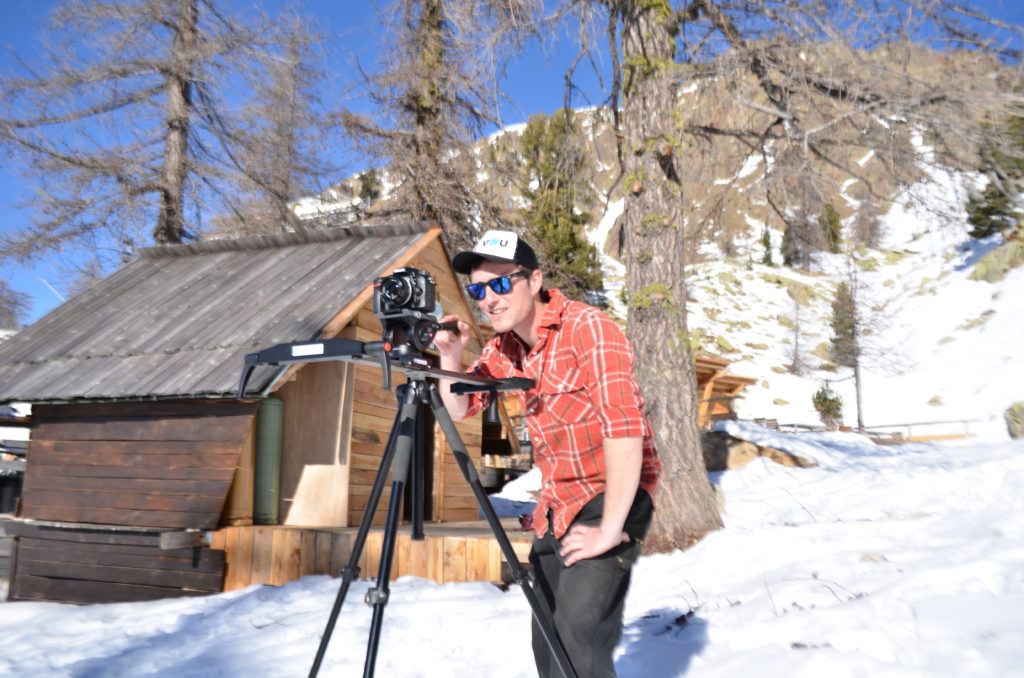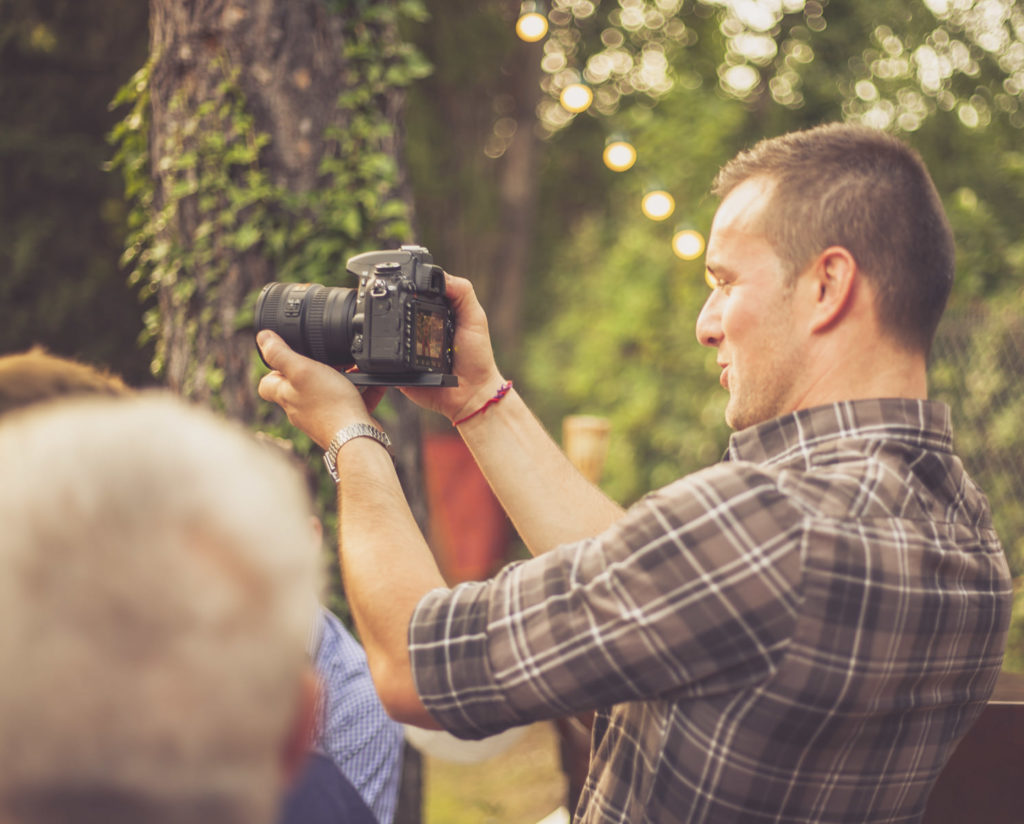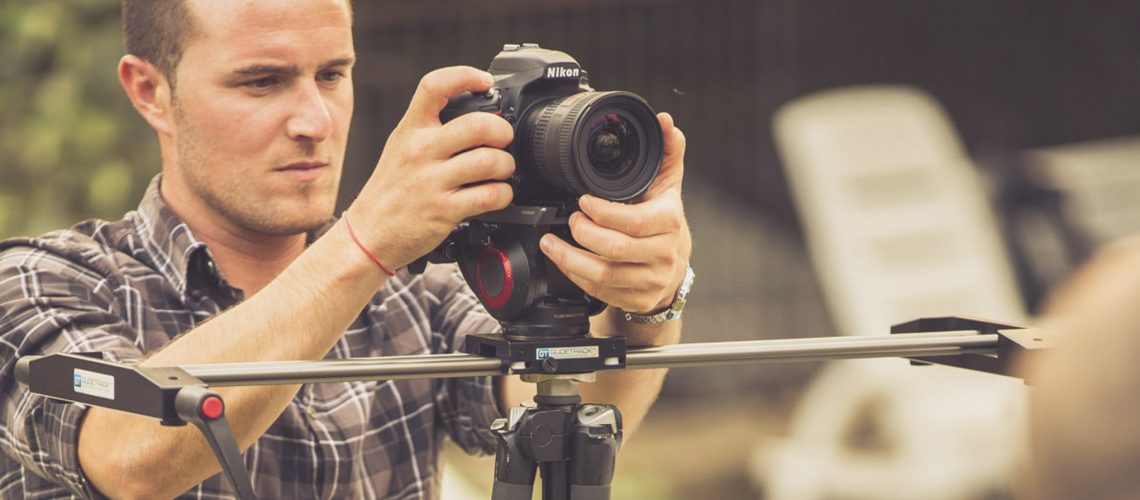Table des matières
Originally from Bollène in the Vaucluse (84) and a lifelong mountain enthusiast , I wanted to see as much of the world and travel as possible before settling down somewhere. It was natural for me to go into the restaurant business, as it allowed me to find work just about anywhere, very quickly, and above all to meet lots of people. I spent 10 years of my life on the road, on every continent, without having to worry about anything except deciding on my next destination and how long I was going to stay there. Every time I left, it was always the same ritual: I’d bring back a little souvenir film for family and friends.
My love of photography and video was born during these trips.
2006: A ski season ⛷️

First DSLR camera: Nikon D7000. Capable of photographing and filming in Full HD. A revolution. This was in 2010. On the tripod, a Glidetrack, a rail for panning. Now a good stabilizer can replace this less-than-ergonomic equipment.
Small montage, big success
Back then, video was still inaccessible… To show a vacation video to friends, they had to come to the house – today, an Instagram post is posted in 2 seconds, a Youtube video is uploaded in 2 minutes, and a WeTransfer file is downloaded in 30 seconds. As soon as the first video platforms appeared, I realized that there was enormous potential in this sector.
So I started slipping a Nikon 7000 into my bag, and during a season at Isola 2000, I took my first photos and shot my first videos. And I got off on it. At the dawn of my 26th birthday, I developed a new ambition: to make ski films.
For five years, I worked as a restaurant manager, between Whistler, Melbourne, London and Rio de Janeiro. I love the atmosphere in restaurants, where you meet people, both customers and staff. At the same time, I’m starting to make more and more films, I’ve initiated several photo/video projects, and I’m taking advantage of my free time to perfect my skills. I do a lot of street portraiture (project Human of Shoreditch in London) to hone my technique and versatility, and I make lots of videos in many different fields.
I’m starting to make videos for the ski resorts where I work, and I’m getting more and more requests for invoices.
2014: My debut as an auto-entrepreneur 😨

On my first big contract with the travel agency Evaneos. 3 weeks of travel in China to enhance their web page promoting this destination.
During 2014, my videography business gradually grew thanks to word-of-mouth, but I continued to work in the restaurant business at the same time. It was in 2015 that my business became stable enough to devote myself to it full-time. The ISOLA 2000 station became my first customer, and it was thanks to them that I took the plunge into entrepreneurship. Not without apprehension, but I’m having a lot of fun because I’m mixing my two passions: skiing and video.
2015 is going to be a very busy year, with a lot to learn.
The 10,000-hour theory… With this adage firmly in mind, I set out to find the smallest assignment, even if it meant accepting free jobs.
And then it all came together. I made my first professional trip to China for a tailor-made travel agency, and then it was a revelation. I spent three weeks touring the country, capturing images for their database, and I got paid for it. A dream come true!
During the winter season, I spend most of my time at the Isola 2000 snowpark, making videos with riders and promoting the park. I have to admit, I’d never have been able to develop this business without relying on my network of friends and family, who have recommended me at one time or another and had faith in me. But what will really make the difference and get me off the ground are my (very) many wedding services.
Wedding souvenir maker 💍

Working on weddings allowed me to meet people, hone my technique and build up my portfolio. My first wedding film with a couple of friends gave me my foot in the door, and I went on to shoot around thirty films after that.
Working on weddings was a very good school for progress, requiring a certain rigor and an unfailing ability to adapt: finding the right light, being in the right place, knowing how to place people to get the desired image.
All the little seeds I’d planted over the last few years are starting to germinate, word of mouth is spreading and I can finally make a living from my passion and concentrate on my work, without the mental burden of having to find clients.
My wedding demo tape.
What about 2023? 🎥
Today I’m based on the Côte d’Azur and continue to make videos in the mountains, having become ambassador and photographer/videographer for a French technical clothing brand, Lagoped. I continue to make commercials, short films, interviews and event films for local and international companies. I’m also continuing to travel, having become an expert in field reporting in the field of development aid, mainly in Africa. So between snow-covered summits, filming in Monaco and reporting from the field in Africa, there’s never a day that’s the same!
My advice if you want to get into video ...
After a 14-year self-taught journey to make a living from my passion, the advice I would give to a young person who wants to start out, or someone who is retraining, would be as follows:
- As Orelsan so aptly put it, “If you want to make movies, you just need something that shoots. Saying ‘I don’t have the equipment or the contacts’is avictim’s trick. If you want to start out as a videographer, buy your own equipment and train with it until you’ve mastered it. You don’t need to have a super-expensive camera, the most important thing is to master your tool and have the right lenses to be versatile according to the projects you’ll be offered. As for editing, all you need is a recent computer and training in professional editing software.
- Post your work on social networks! The more you’re out there, the more people think you’re in demand and professional. People may know you’re a videographer, but if you’re not constantly in front of them, they won’t think of you when the opportunity arises. You have to be omnipresent!
- Do as many weddings as possible! On weddings and other shoots, a videographer isn’t just “the guy who films”, he’s a conductor. You have to be able to drive the human element and have enough glibness to be able to put people at ease, guide them... And weddings are a great training ground for that. You’ll work on your rigor, your technique and your interpersonal skills.
And my last piece of advice: don’t be afraid of something you don’t know how to do.
If you’re offered a project for which you need equipment, rent it! A project for which you’re lacking a few skills? Something you don’t know how to do? Instead of stuttering, just say yes, and you’ll see.
These days, there are tutorials for everything on YouTube, and there’s nothing like learning by doing!
Finally, if you want to get started as a videographer, consider a career change or set up your own video production company, Solid Rusk has put together a dedicated article: 5 pro tips for getting started as a videographer.
Article written by Emeline l Prête-moi ta plume
